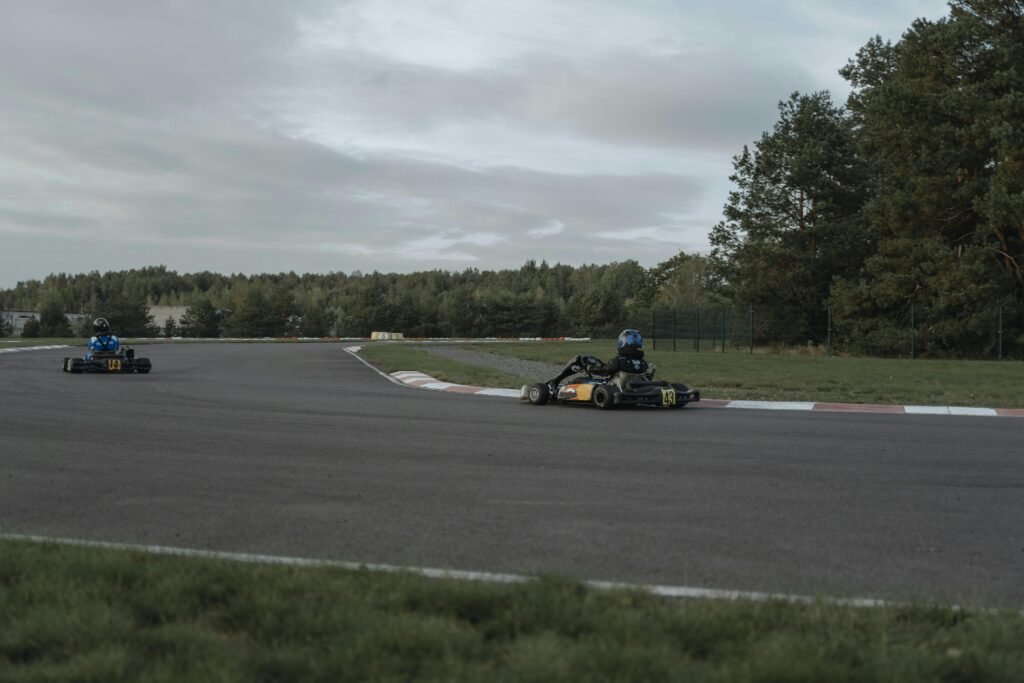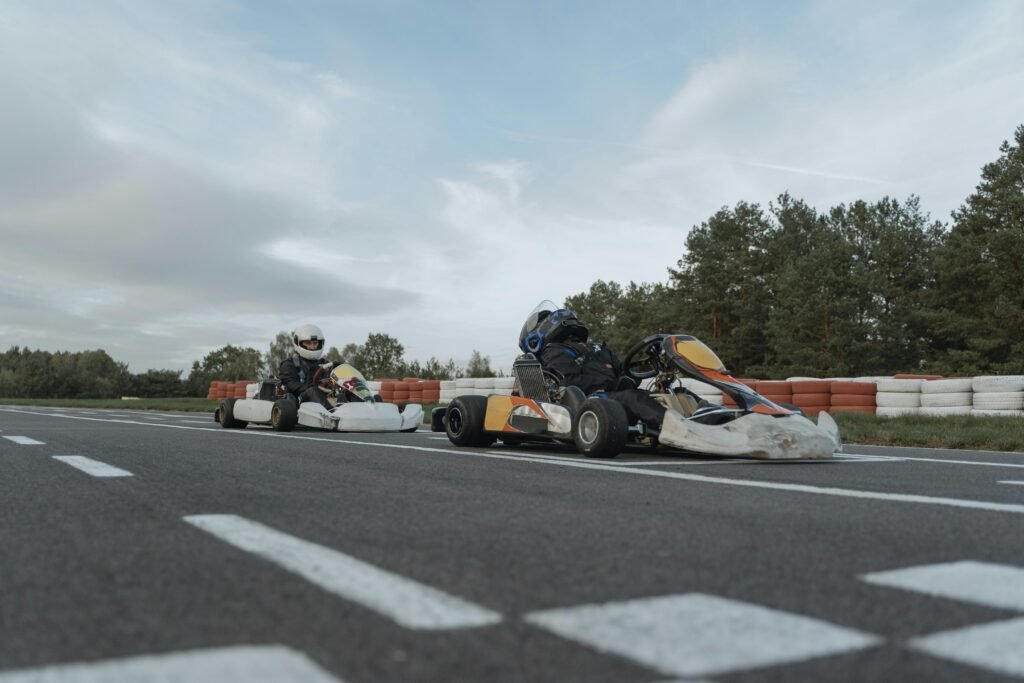Karting is often viewed as an exciting and adrenaline-fueled sport, but its benefits extend far beyond the race track. One of the most significant advantages of karting is its ability to sharpen mental focus and enhance cognitive abilities, skills that can positively impact areas like academic performance and everyday life.

For children, teens, and even adults, the mental discipline developed through karting can lead to improvements in concentration, decision-making, and problem-solving—critical skills that apply as much in the classroom as they do on the track.
Here’s how karting boosts mental focus and contributes to overall cognitive development, helping racers improve not just their driving performance, but also their academic and daily lives.
1. Improving Concentration and Focus
Karting requires drivers to maintain intense concentration over the course of a race. Whether navigating sharp corners, avoiding collisions, or overtaking opponents, racers must stay completely focused on the task at hand. This heightened state of mental alertness is directly transferable to other areas, such as schoolwork or professional tasks.
How karting enhances concentration:
- Single-task focus: On the track, drivers need to focus solely on driving, blocking out distractions. This ability to concentrate on one task at a time translates to better focus in environments like classrooms or work settings, where minimizing distractions is key to success.
- Extended attention span: Karting races can last anywhere from a few minutes to an hour, requiring drivers to stay engaged and mentally sharp throughout. This practice helps build an extended attention span, which is crucial for tasks like studying or completing long-term projects.
Key Takeaway: By training the brain to stay focused under pressure, karting helps improve concentration and focus in academic and real-world settings.
2. Enhancing Quick Decision-Making Skills
On the karting track, drivers must make split-second decisions that can determine their performance, such as when to brake, when to accelerate, or how to avoid an obstacle. This kind of rapid decision-making builds mental agility and trains the brain to process information quickly and accurately.
How quick decision-making improves focus:
- Real-time problem solving: During a race, drivers constantly analyze the track, the position of other racers, and their own kart’s performance. This fast-paced decision-making translates into improved problem-solving skills in academic settings, where students must quickly analyze and respond to questions or assignments.
- Handling pressure: Racing puts drivers in high-pressure situations where decisions must be made quickly. Learning to stay calm and focused under pressure on the track can help students better handle stressful situations like exams or public speaking.
Key Takeaway: Karting enhances quick thinking and decision-making under pressure, skills that can lead to better academic performance and improved mental focus in challenging situations.
3. Building Strategic Thinking and Planning

Karting is not just about speed; it’s about strategy. Drivers must plan their approach to corners, overtakes, and even tire management over the course of a race. This strategic thinking helps develop cognitive abilities that are crucial for problem-solving and analytical tasks in academic and professional contexts.
How karting promotes strategic thinking:
- Forward thinking: To navigate a track efficiently, drivers must plan several corners in advance, considering the best racing lines and braking points. This kind of forward-thinking improves planning and foresight, which are essential skills for managing long-term school projects, exams, or real-life challenges.
- Adaptability: Racing conditions can change in an instant, forcing drivers to adapt their strategy mid-race. This ability to pivot and change plans on the fly enhances flexibility in problem-solving, allowing students to tackle unexpected questions or challenges with ease.
Key Takeaway: Karting teaches drivers to think ahead and develop strategies, improving their ability to plan and adapt in both academic and real-world situations.
4. Enhancing Memory and Cognitive Recall
Karting involves memorizing track layouts, braking points, and optimal racing lines, all while keeping an eye on competitors and anticipating their movements. This constant mental exercise helps improve short-term and long-term memory and boosts cognitive recall—skills that are essential in the classroom.
How memory improvement enhances focus:
- Track memorization: Drivers need to remember the details of each track, from the sharpness of corners to the best places to overtake. This practice strengthens memory, which can help students better retain and recall information during tests or presentations.
- Cognitive recall under pressure: During a race, drivers must recall the track layout and racing strategies while under pressure. This improves cognitive recall in stressful situations, allowing students to perform better during exams or when faced with challenging tasks.
Key Takeaway: Karting boosts memory and cognitive recall, helping individuals retain and retrieve information more efficiently in academic and professional contexts.
5. Developing Emotional Control and Resilience
The mental discipline required in karting helps drivers build emotional control, teaching them how to manage frustration, stay calm, and bounce back from setbacks—whether that’s a spin-out on the track or losing a position in a race. This ability to regulate emotions translates into better focus in stressful or high-pressure environments, such as the classroom.
How emotional control aids focus:
- Managing frustration: On the track, mistakes can happen, but drivers must quickly recover mentally to stay competitive. Learning to manage frustration or disappointment in karting helps students handle setbacks—such as getting a poor grade or facing difficult assignments—without losing focus.
- Building resilience: Losing a race or making an error in karting teaches resilience, encouraging drivers to keep pushing and improving. This resilience helps students stay motivated and focused, even in the face of academic challenges.
Key Takeaway: Karting builds emotional control and resilience, helping individuals maintain focus and motivation in challenging academic or real-life situations.
6. Improving Hand-Eye Coordination and Reaction Times
The physical demands of karting also contribute to cognitive development. Hand-eye coordination and reaction times are critical in karting, where drivers must react quickly to changes in track conditions, other racers, or obstacles. These physical responses sharpen mental agility and enhance the brain’s ability to process and respond to information quickly.
How physical responses aid mental focus:
- Hand-eye coordination: The connection between what drivers see on the track and how they react with their hands and feet helps develop faster reflexes, improving the brain’s ability to process visual and sensory information. This is directly transferable to activities like note-taking, typing, or even sports.
- Faster reaction times: The need to react quickly to unexpected obstacles or changes during a race helps build rapid cognitive responses, improving focus and concentration in situations that require quick thinking—whether that’s answering a tough question in class or responding to a change in a project.
Key Takeaway: Karting enhances hand-eye coordination and reaction times, helping drivers improve their cognitive processing and ability to focus quickly and accurately.
7. Boosting Confidence and Self-Esteem
Karting can also significantly boost a driver’s confidence and self-esteem as they improve their racing skills. This newfound confidence carries over into other aspects of life, including academics, where students who believe in their abilities are more likely to stay focused and succeed.
How confidence boosts focus:
- Achieving milestones: Success on the track, whether through faster lap times or better control, reinforces the idea that practice leads to improvement. This same mindset can motivate students to focus on their academic work, knowing that consistent effort will lead to success.
- Increased self-esteem: As drivers improve, they build self-esteem, which helps them tackle academic challenges with a positive attitude. This confidence helps students maintain focus, even when faced with difficult subjects or assignments.
Key Takeaway: Karting builds confidence, helping individuals stay focused and motivated in academics and other areas of life.
Karting as a Cognitive Booster
Karting isn’t just about speed and competition—it’s also a powerful tool for developing mental focus, strategic thinking, decision-making, and emotional control. These cognitive benefits extend beyond the race track and can greatly enhance performance in academic settings, where focus, problem-solving, and resilience are essential.
Ready to boost your focus? Whether on the track or in the classroom, karting provides a unique way to develop essential mental skills that can help you succeed in all areas of life!
Book your session at Aruani Grid Motorsports Academy in Bangalore and experience the thrill of karting while sharpening your mind.
